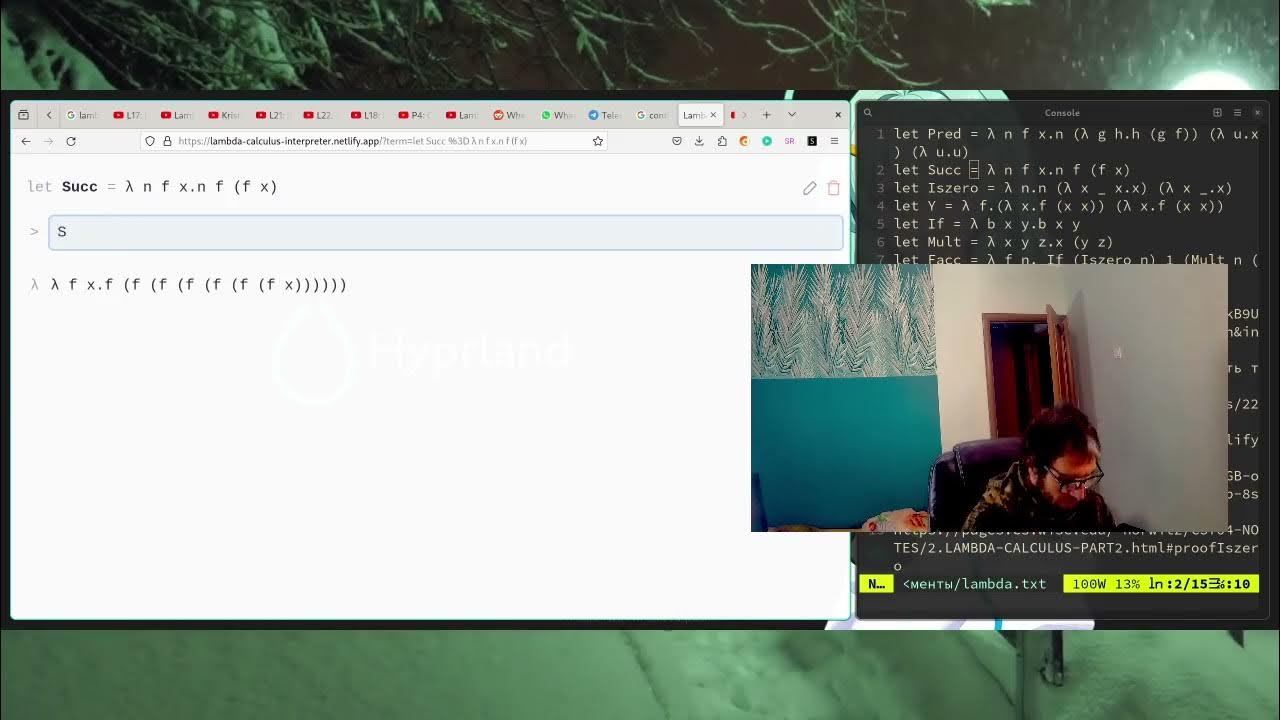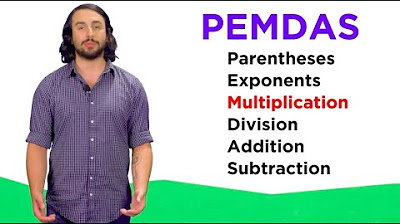lazy evaluation in lambda calculus
TLDRThe video script discusses Lambda calculus, highlighting the two evaluation orders: normal order and applicative order. It explains that normal order evaluation always reaches the normal form if it exists, but may perform unnecessary work by re-evaluating similar sub-expressions. To address this, the concept of lazy evaluation with memorization is introduced, which avoids redundant computations and enhances computational efficiency.
Takeaways
- 📘 Lambda calculus has two main evaluation orders: normal order and applicative order.
- 🔍 In normal order evaluation, if a normal form exists, it will always be reached, providing a guarantee of completion.
- 🔄 Applicative order evaluation may not reach a normal form if one exists, due to the way it handles evaluation.
- 🚫 Terms in Lambda calculus may not have a normal form, leading to non-terminating computations.
- 🔧 Normal order evaluation can be improved by incorporating memoization to avoid unnecessary repeated evaluations of similar sub-expressions.
- 🛑 Normal order evaluation inherently has a form of laziness, as it does not evaluate arguments unless necessary.
- 💡 Lazy evaluation enhances the effectiveness of computation by avoiding the evaluation of expressions that are not needed.
- 🔗 Memoization uses a cache to store the results of expressions, allowing for quick replacement instead of re-evaluation.
- 🔄 The script discusses the trade-offs between normal order and applicative order evaluation in terms of reaching normal forms and computational efficiency.
- 📚 The concept of memoization is presented as a method to improve the efficiency of normal order evaluation by reducing redundant computations.
- 🔑 The script emphasizes the importance of understanding different evaluation strategies in Lambda calculus for effective computation.
Q & A
What are the two main orders of evaluation in Lambda calculus?
-The two main orders of evaluation in Lambda calculus are the normal order of evaluation and the applicative order evaluation.
What is the significance of a term having a normal form in Lambda calculus?
-A term having a normal form in Lambda calculus means it can be reduced to a simplest form where no further reduction is possible, indicating a final result of the computation.
Why might a term not have a normal form?
-A term might not have a normal form if it gets stuck in an infinite loop of reductions without reaching a simplest form, which is also known as non-terminating.
What is the main advantage of normal order evaluation over applicative order evaluation?
-The main advantage of normal order evaluation is that it guarantees reaching the normal form if it exists, ensuring the computation will always proceed to completion when possible.
What is the downside of normal order evaluation mentioned in the script?
-The downside of normal order evaluation is that it may perform unnecessary work by repeatedly evaluating similar subexpressions, which can be inefficient.
What is Lazy evaluation and how does it relate to normal order evaluation?
-Lazy evaluation is a strategy where expressions are not evaluated unless their values are needed. It relates to normal order evaluation by incorporating memorization to avoid re-evaluating expressions, thus improving efficiency.
What does it mean for an evaluation strategy to have 'laziness'?
-An evaluation strategy having 'laziness' means it defers the evaluation of expressions until their results are actually required, potentially saving computational resources.
What is the role of memorization in improving the efficiency of evaluation?
-Memorization in evaluation strategies, such as in Lazy evaluation, caches the results of expressions. When an expression is encountered again, instead of re-evaluating it, the cached result is used, which saves time and resources.
Why is the leftmost outmost function call not reduced in normal order evaluation until needed?
-In normal order evaluation, the leftmost outmost function call is not reduced until its arguments are needed to avoid unnecessary computation,体现着策略的'惰性'.
How does the use of cash (caching) improve computational effectiveness?
-Using cash (caching) improves computational effectiveness by storing the results of evaluated expressions, allowing quick retrieval and reuse without re-evaluation, thus speeding up the computation process.
Outlines
📚 Lambda Calculus Evaluation Orders
The script introduces the concept of evaluation orders in Lambda calculus, focusing on two main types: normal order and applicative order. It explains that terms in Lambda calculus may or may not have a normal form, and the existence of a normal form is guaranteed to be reached through normal order evaluation. However, this method may perform unnecessary work by re-evaluating similar sub-expressions. To address this, the concept of lazy evaluation is introduced, which incorporates memorization to avoid redundant calculations and improve computational efficiency.
Mindmap
Keywords
💡Lambda calculus
💡Normal order evaluation
💡Applicative order evaluation
💡Normal form
💡Memoization
💡Lazy evaluation
💡Sub-expression
💡Function abstraction
💡Function application
💡Efficiency
💡Cash (Caching)
Highlights
Introduction to Lambda calculus and its two main evaluation orders.
Explanation of the normal order of evaluation in Lambda calculus.
Description of applicative order evaluation and its potential to not reach a normal form.
The existence of a single normal form in some Lambda calculus terms.
The guarantee of reaching the normal form with normal order evaluation if it exists.
The potential for unnecessary work with normal order evaluation due to repeated evaluation of similar subexpressions.
Introduction to the concept of Lazy evaluation as an improvement over normal order evaluation.
The inherent laziness of normal order evaluation in not reducing arguments unless necessary.
The use of memorization in Lazy evaluation to avoid redundant computations.
The effectiveness of using a cache in Lazy evaluation for improved computational performance.
The contrast between normal order and applicative order evaluation regarding reaching a normal form.
The limitations of normal order evaluation in terms of efficiency due to repeated work.
The advantages of Lazy evaluation in reducing unnecessary computations.
The mechanism of memorization in Lazy evaluation allowing for the reuse of previously computed results.
The importance of understanding different evaluation strategies in Lambda calculus for optimizing computations.
The practical implications of evaluation strategies on the efficiency of Lambda calculus computations.
The theoretical underpinnings of evaluation strategies in the context of Lambda calculus.
Transcripts
5.0 / 5 (0 votes)
Thanks for rating:





